 MyDogBreeds
MyDogBreeds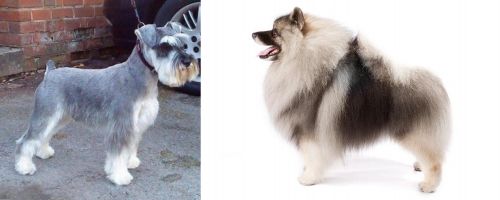 Miniature Schnauzer is originated from Germany but Keeshond is originated from Netherlands. Miniature Schnauzer may grow 12 cm / 4 inches shorter than Keeshond. Miniature Schnauzer may weigh 8 kg / 17 pounds lesser than Keeshond. Both Miniature Schnauzer and Keeshond has almost same life span. Both Miniature Schnauzer and Keeshond has same litter size. Both Miniature Schnauzer and Keeshond requires Moderate maintenance.
Miniature Schnauzer is originated from Germany but Keeshond is originated from Netherlands. Miniature Schnauzer may grow 12 cm / 4 inches shorter than Keeshond. Miniature Schnauzer may weigh 8 kg / 17 pounds lesser than Keeshond. Both Miniature Schnauzer and Keeshond has almost same life span. Both Miniature Schnauzer and Keeshond has same litter size. Both Miniature Schnauzer and Keeshond requires Moderate maintenance.
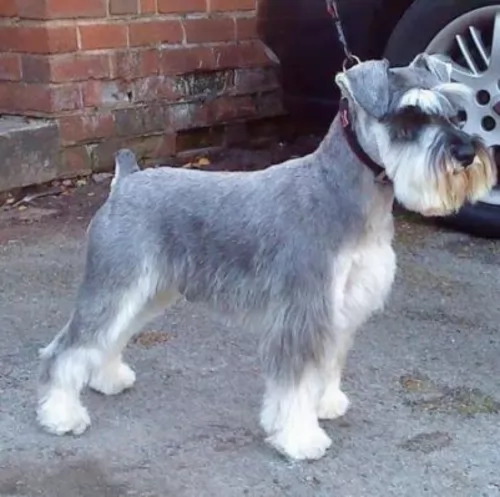 Miniature Schnauzers were first bred in Germany in the 19th century being bred from Affenpinschers and Standard Schnauzers.
Miniature Schnauzers were first bred in Germany in the 19th century being bred from Affenpinschers and Standard Schnauzers.
This dog was always used to control rats on farms, but these days he is more a companion. It is believed that the start of the modern Miniature Schnauzer in the United States was around 1924 when dogs were imported from Germany.
It was in 1933 that the Miniature Schnauzer was recognized by the AKC as a separate breed from the Standard Schnauzer.
 Keeshond is the term used for German Spitzes and although many American references have it that the Keeshond originated in the Netherlands, some say the dog originated in Germany and is a member of the German Spitz family.
Keeshond is the term used for German Spitzes and although many American references have it that the Keeshond originated in the Netherlands, some say the dog originated in Germany and is a member of the German Spitz family.
The Club for German Spitzes was founded in 1899. The Nederlandse Keeshond Club was formed in 1924. The Keeshond is also referred to as ‘The Smiling Dutchman’.
It was in the 17th and 18th centuries that the Keeshond was used greatly as a watchdog, appearing in England in the late 1800s, but after the turn of the 20th century, Mrs. Wingfield Digby of Dorset, England and Mrs. Alice Gatacre, a Dutch breed authority, living in England, stirred interest in the breed with their kennels.
An English breed Club was formed in 1926, and the first Keeshond was registered with The American Kennel Club in 1930.
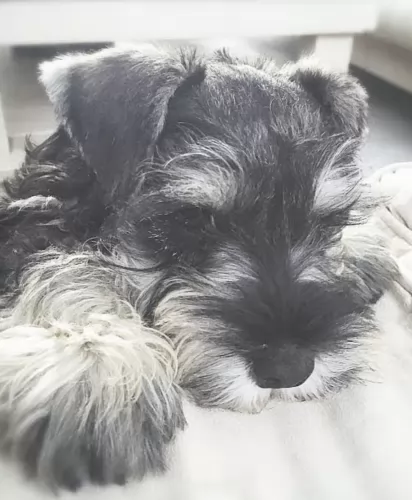 The Miniature Schnauzer is a small dog breed that stands between 30 to 36cm in height and weighs between 5 and 10kg.
The Miniature Schnauzer is a small dog breed that stands between 30 to 36cm in height and weighs between 5 and 10kg.
He has a sturdy body with a dense, wiry coat which most people prefer to have stripped. Because stripping is quite tedious, many of these dog owners prefer to have the coat clipped which actually gives the coat a greyish look to it.
The coat is usually a mix of black and silver. Some people refer to the Miniature Schnauzer as having a salt-and-pepper coat – hairs that are a mix of black and white. The dog has a double coat with the outer coat being wiry and the undercoat being a lot softer.
This is a dog that will need to be groomed frequently to prevent matting. A noticeable feature with these dogs is the rectangular shaped head with alert slanted eyes and bushy eyebrows, mustache and beard. In fact the word ‘Schnauzer’ means beard or muzzle.
The ears have been traditionally cropped but these days they are left and then they tend to be half-erect, half-floppy.
This is a tough little dog, fearless, cheeky, arrogant, alert and also friendly. A draw-card with him is that he is considered as a low-shedder and being hypoallergenic.
They’re very intelligent dogs too and will learn quickly when you give him training and socialization. This is important for a dog like this as he can quickly show you that he is strong willed and independent. Training and socialization makes him much nicer as he becomes more balanced and obedient.
He is full of life and extroverted and you can count on him to join you wherever you are and whatever you’re doing. Whether watching TV, swimming or hiking, he’ll be there and turn every occasion into a festive event. He is a loving, loyal dog, making a splendid pet.
He's protective of his human family and tends to be suspicious of strangers, and this is what makes him such a great watchdog.
 The Keeshond is a medium-sized dog and a member of the Spitz group of dogs. He stands at 43 – 48cm in height and weighs 14 – 18kg.
The Keeshond is a medium-sized dog and a member of the Spitz group of dogs. He stands at 43 – 48cm in height and weighs 14 – 18kg.
He has a 2-layered, dense coat which is fairly long, straight and coarse and colors are grey, silver, black and cream. His undercoat is a very light cream color. He has erect ears, a fairly shop muzzle and a feathery, plumed tail which curves over his back.
The hair on his legs is fairly short accompanied with some feathering. A typical marking-feature of the Keeshond is the dark line which runs from the outer corner of each eye to the lower corner of each ear. It's what gives the dog his well known keeshond expression. The eyes of the dog are dark brown.
The Keeshond, just like other Spitz dogs, are playful, affectionate, friendly and eager to please. He is intelligent too and will respond well to training and socialization.
He makes a wonderful family pet as he is friendly and playful with children, loving all their games. He gets on well with other pets too. He is a social dog, thriving on being with his human family, wanting to participate in all family activities.
They are sensitive, loving pets and become very attached to their owners. They have even been used as comfort dogs in rescue situations, as they bond so well with people.
He makes a good watchdog too with his loud bark which he uses to deter intruders. He may well be a good watch- and guard dog but he isn't an aggressive dog.
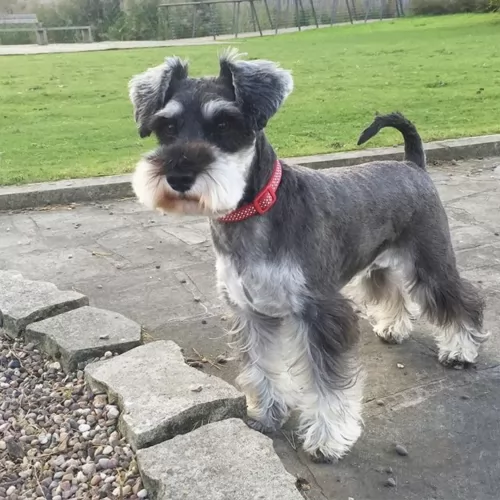 Miniature Schnauzers are such adaptable little dogs, quite happy to make a home with you in the city or in the countryside.
Miniature Schnauzers are such adaptable little dogs, quite happy to make a home with you in the city or in the countryside.
They’re sociable dogs, so just being with his human family wherever they are will suit him well. If he lives in the city however, he will need to have a walk everyday or taken to the park for a run.
He is also a dog that scarcely sheds, so he suits people battling with allergies. With an average life expectancy of 12 to 14 years, if you nurture your Mini Schnauzer and give him the best food and exercise there is, as well as loving him, you’re going to have a loyal and devoted pet.
 The Keeshond, with his thick double coat, loves to be outdoors in cool weather. He won't be there too long however, because he will be missing his human family. He is such a social dog, craving human company and therefore isn't a dog to be put out in the backyard and left day after day.
The Keeshond, with his thick double coat, loves to be outdoors in cool weather. He won't be there too long however, because he will be missing his human family. He is such a social dog, craving human company and therefore isn't a dog to be put out in the backyard and left day after day.
He loves games and being totally involved with his human family. Look after your Keeshond well – he is a companion dog - and you will find him to be a most exceptional friend of yours.
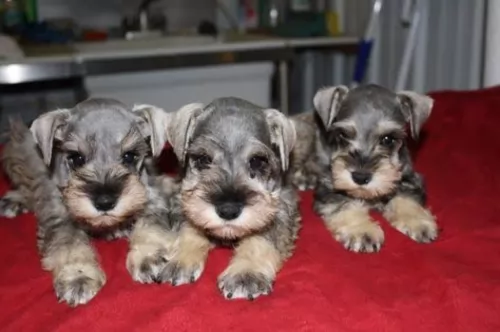 Your Miniature Schnauzer is pretty healthy and he isn’t likely to cost you much in terms of vet fees. There are however some common dog problems that you want to be aware of such as cataracts of the eye and hypothyroidism.
Your Miniature Schnauzer is pretty healthy and he isn’t likely to cost you much in terms of vet fees. There are however some common dog problems that you want to be aware of such as cataracts of the eye and hypothyroidism.
This a a problem in the lens of the eye. The lens should be clear, and when a dog has a cataract, it obscures the vision. The size of the cataract can lead to blindness.
Diabetes in a dog can bring on cataracts as can genetics or damage to the eye from exposure to ultraviolet light. Fortunately, dogs with cataracts can still see. Dogs with old cataracts can have surgery to remove them.
When a dog owner suspects a cataract in their pet’s eye it is best to treat it immediately with anti-inflammatory dog cataract eye drops. Cataracts never go away however without surgery.
The thyroid gland in the neck produces a hormone called thyroxine. It controls metabolism, but with hypothyroidism, enough of the hormone isn’t made. Its a common disease which affects all dog breeds.
Signs of hypothyroidism include hair loss, weight gain, intolerance to cold and a troublesome skin. To have the disease diagnosed, the vet will do a series of blood tests.
 With good food, fresh water, exercise and lots of interaction with your Keeshond, he can reach 12 to 14 years of age.
With good food, fresh water, exercise and lots of interaction with your Keeshond, he can reach 12 to 14 years of age.
No matter how healthy your dog is, he can still get ill, but the chances are less likely when he is feed nutritionally. Nonetheless look out for hip dysplasia, bloat, ear infections, skin rashes and eye diseases.
This is a problem in the lens of the eye. Your dog has a cloudy look to the eye. A cataract can occur when the cells are damaged. A disease such as diabetes can also cause a cataract and high blood sugar levels can change the metabolism of the cells in the lens.
The lens should be crystal clear, but with a cataract, the vision of the dog is obscured. It can cause blindness. Thankfully, cataracts aren't painful and most times dogs with cataracts can still see. There is the option of surgery to remove them too.
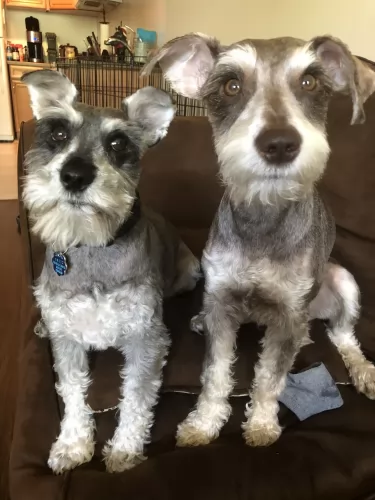 Let’s look at several ways you need to care for your Miniature Schnauzer -
Let’s look at several ways you need to care for your Miniature Schnauzer -
Make sure you have his puppy injections on time. This means knowing which veterinarian you’ll use. Later on if you don’t want to go in for breeding, you will need to have your pet spayed or neutered.
Make sure you have a nice warm, dry spot for your dog to sleep. It can be a cardboard box, or you can buy a dog basket or sleeping platform. Make sure your pet loves it and knows he can retreat to it anytime he wants.
If he goes outside for a few hours, make sure that he has a place to lie in the shade and away from the elements.
Good food promotes good health and longevity. You can feed your pet one of the top quality commercially manufactured foods and give your pet some variety by adding in some boiled chicken, vegetables and brown rice. Some raw meat occasionally can also be excellent for your pet.
 With his double coat, your Keeshond will need regular brushing to get rid of all those loose hairs. He is a dog which doesn't have that typical dog odor about him so bathing him is discouraged. Too much bathing irritates a dog's skin and dries it out.
With his double coat, your Keeshond will need regular brushing to get rid of all those loose hairs. He is a dog which doesn't have that typical dog odor about him so bathing him is discouraged. Too much bathing irritates a dog's skin and dries it out.
Check the inside of his mouth and make sure that his teeth are in a healthy state. If you are unsure, speak to your vet about dental hygiene as bad teeth won't only cause pain and discomfort for your pet, the teeth can affect his immune system and other body parts.
Check his claws too and have them cut when they become too long. When they are long they can hook on things and injure the sensitive area of the paws.
The Keeshond is a sturdy dog, loving all the activities and games that his family are involved in. He will love to be your walking companion and looks forward to his walk every day.
He is such a playful, adventurous dog and is always willing to join you in new games. Never put him in your back garden and forget about him, as this will make him ill and depressed. He must be part of the family to be healthy and happy and relies on you to include him in all your activities. He can live in the city or the countryside but will require being exercised wherever he is.
Top quality dry kibble will work for your Keeshond. If you want to keep him bright eyed and bushy tailed, mix in some quality home-made food too such as cooked chicken, rice and vegetables. You can also try to sometimes include a little bit of raw meat as well.
He is an active dog and will need a diet high in protein. Also, his thick coat needs to be maintained, and apart from regular brushing, look for quality dog foods that have Omega-3 fatty acids in them so as to maintain the skin and coat of the dog. Make sure he always has access to fresh, cool water.